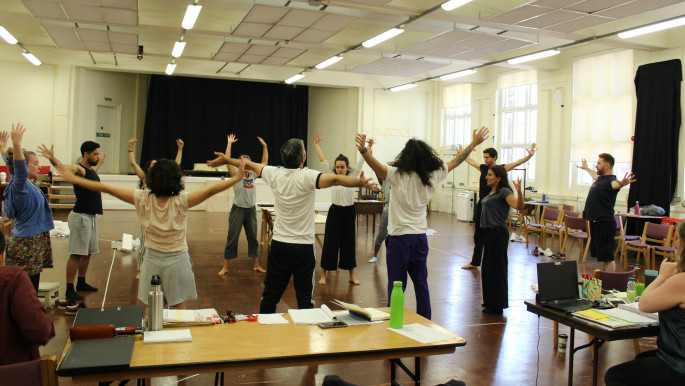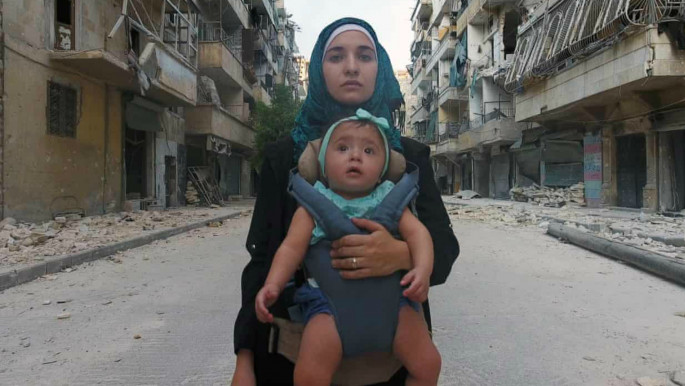Laban: Healing Beirut's wounds through art
As the lights brighten up the stage, the actors gathered next to each other and started chanting alongside the audience "once upon a time there was a city, the rooftop of that city finally became the city".
The whole room erupted with joy, amusement and hints of sadness as another "playback theatre" show came to an end on a warm Wednesday evening on a small rooftop in Beirut.
Laban studios is an improvisational theatre-based organisation that was formed back in 2007 by Rafi Feghaly after he got inspired by an improv festival in Amsterdam.
But it was not until 2009 when Laban launched officially as a tool for the promotion of human and social rights as well as raising awareness for multiple causes.
Their shows consist primarily of three variations of theatre: improvised theatre, creating a storyline similar to a film on the spot, playback theatre, replaying other people's stories through improvised performances, and forum theatre which is oriented around oppressed groups and requires audience members to partake in the re-enacted stories as actors themselves.
Abdullah Jatal, director and actor of improvised theatre, described the actors "overly rehearsed" as they do not plan anything but act as a basketball team.
 |
It was not until 2009 when Laban launched officially as a tool for the promotion of human and social rights as well as raising awareness for multiple causes |  |
"They know how to pick up each other's cues but they can't expect anything so they just rely on their knowledge of each other and whatever the flow brings," Jatal told The New Arab.
The artistic director and one of the actors of the playback theatre productions, Farah Wardani, admits that the process of training actors to reach a deep understanding of the teller's story takes around a year until it becomes "second nature" to them.
 |
|
| Read also: Royal Shakespeare Company play interrogates the loss of heritage in contemporary Iraq |
However, the focus of these re-enactments is not a presentation of an individual story but the feelings behind them that the audience as a whole can relate to, such as the anxiety of unemployment in Lebanon or the issue of female harassment.
Wardani described the feeling that the audience gets after their show as "magical" according to the audience's own statement.
"They feel like they are part of a community," she says, "and we aim to create a scene and create regulars, it's very rare for us to get audiences that only show up once to our performances."
Around 12 years ago, Laban could only get at most 10 people to attend their performances. However, now, they have to turn people away from a hall packed to the brim with eager attendees.
Wardani defines the "magic" in their shows as the way actors understand each other and create something out of nothing with an emphasis on the community rather than the individual and the "true" sense of community where the actors pick up on each other's clues in the fraction of a second and form a sense of "one".
Wardani argued that this contradicts modern day societies.
"We are exposed to multiple stories on social media or the news so we think we are empathetic when in reality we are more disconnected than ever," she stated passionately.
"So in the playback show, strangers share their stories and expose themselves in front of group of people they've never met before but through the re-enactments of the 'feelings' the teller experiences during his story, a new bond is created within the audiences where stories become universal and more community based rather than isolated individualistic incidents."
By exposing themselves to the actors and other audience members, "a change of perspective" occurs as Waradni described.
 |
They feel like they are part of a community |  |
She specifically recalled a playback experience with a pro-Islamic State community where the audience was mainly formed of either ex- IS fighters, current fighters or their family members.
Laban teamed up with OTI (Office of Transition Initiatives) to combat the extremist ideologies these groups suffer from indirectly and under the false pretence of "entertainment" through a fun theatre show.
What the two groups aimed to accomplish is to return radicalised individuals to who they were prior to their radicalisation and to make them question their beliefs, priorities and values following intensive research and to make sure that they have an understanding of the recruiting process for IS fighters, their ideologies as well as their religious beliefs in order to make a strong statement when focusing on these types of issues.
One story was about a woman in the audience who shared a story about her son who fought with IS (but is now detained) and how she perceives the Lebanese army as the ultimate enemy.
Since it is against the group's values to re-enact anything based on politics or sectarianism, the conductor of the group redirected the woman's story and asked her about her son's favourite food to which the woman answered "vine leaves". He then asked her if she would continue bringing him vine leaves if he were to keep fighting.
By redirecting the audience's priorities and perspectives, the group of actors manage to touch the audiences in a much deeper and emotional way that the pro-IS audience had not thought of since they became indoctrinated in the extremist group's ideology.
By shifting their focus from "killing is more important than everything", the questions became, according to Wardani: "Is killing more important than my own mother?" "Do I want to see my mother in such pain?"
They also highlight their dislike of terms, such as "martyrs" where death is glorified, and chose to stick with "dead" when referring to an IS fighter who had been killed.
This process proved successful as three members of IS handed themselves in the next day to the authorities after the playback theatre show.
Jatal said that his favourite moments are when there is synchronisation amongst the actors and he feels like there is magic occurring and everything is falling into place.
 |
|
| Read also: For Sama: One mother's astonishing tale for her daughter documenting hope and horror in Syria |
With Jatal coming from Syria, he spoke at length about Laban's "refugees welcome" ideology. Both Jatal and Wardani explained that while the organisation has a wide range of diversity, Palestinians, Syrians, Lebanese, LGBTQ+, feminist, they highlighted their disdain of labels to the point where they created complete homogeneity where no race, colour, background, religion is seen or of any significance.
They also added that they can be short on funds due to their lack of focus on one minority that would attract funds with Wardani saying, "We don't want to say, hey we're LGBTQ+ give us funds!"
But that has not stopped the group that still performs three times a month, every second, third, fourth Wednesday of the week with some of the shows being free.
"We spent two to three years not getting paid and most of us have two or three full-time jobs other than Laban," Jatal explained.
"But we are here to serve the community," Wardani affirmed.
Jatal and Wardani both believe in the change and the impact that Laban has on the Lebanese community.
Wardani recalls another incident where they were performing "forum theatre" and a girl was telling a story about a time when she was harassed by a guy at university where the word "no" was not enough to make him stop. So a man was invited on stage to play the role of the girl and whilst doing so, the guy had to come up with multiple ways to make the harasser understand that he was not interested in him.
After several attempts and failures, the guy finally came to the conclusion that the reality of a being a woman is harder than what it seems and that is not a "laughing" or "light" situation where the girl just needs to ignore it and move on.
While Laban focuses a lot on communal and societal problems within the Arab world, the concept of "improvised acting" is still widely misunderstood and hindered due to that misunderstanding.
As with many art forms in post-war societies, finances are an issue and popularity is hard to gain and follow ups are necessary due to the psychological complexities that ensue.
But despite this, Laban remains hopeful and as Jatal states about refugees in Lebanon, "We aim to give them voices as we want to create a safe space for people in general and marginalised groups in particular."
In a city where 18 religious sects divide its people, politics, streets and even artworks, Laban looks to create what the civil war destroyed: community.
By bringing each individual's struggles and emotions on stage, it allows Laban to shrink the divide between people and create a new and lasting bond between them within an idealistic Arab society where borders are broken down and Syrians, Palestinians and Lebanese just become Arabs, personified by the group's slogan: "Your stories are the city. You, yourself are the city".







